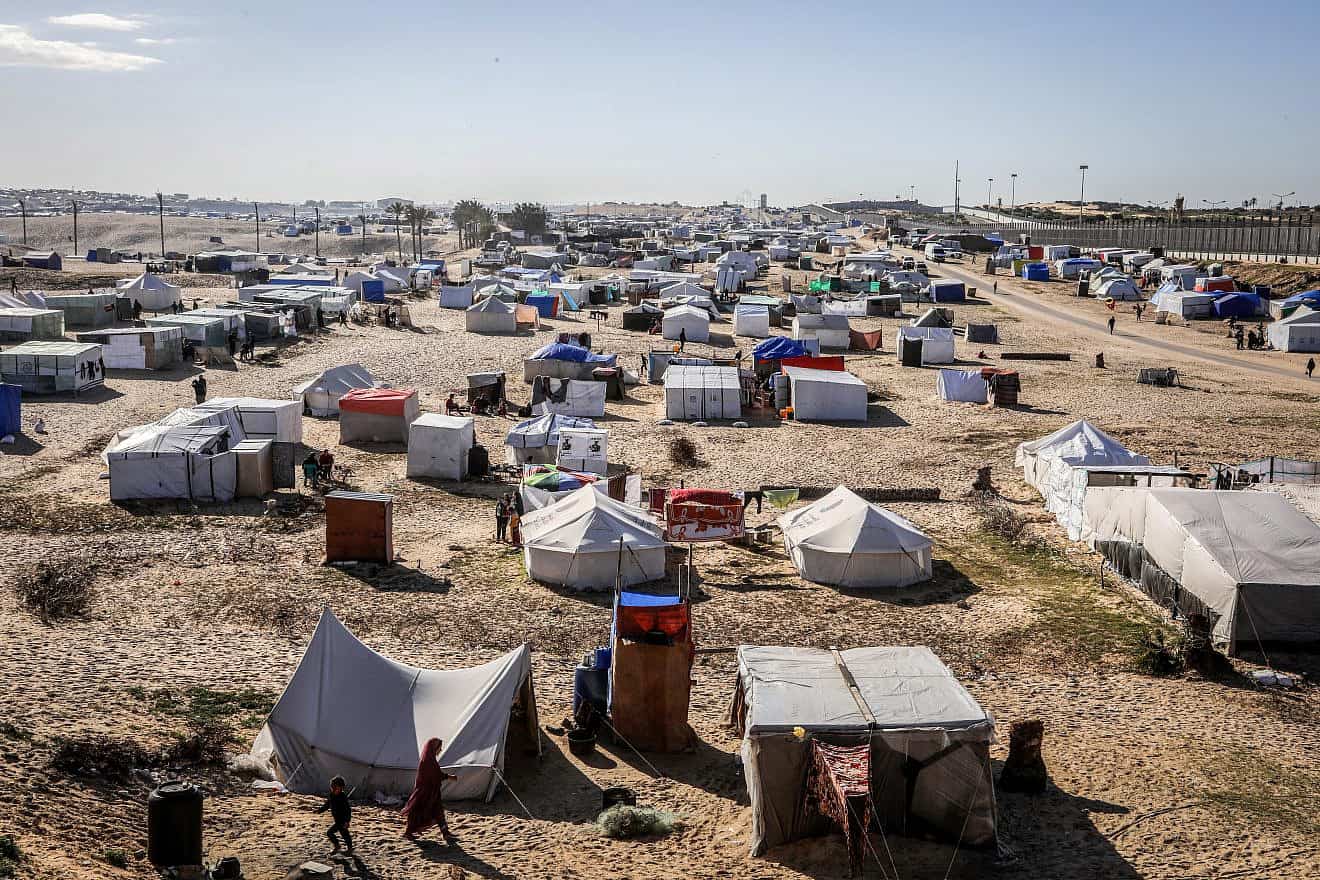by Yaakov Lappin
The IDF’s Rafah operation must begin with a large-scale evacuation and screening to ensure that terrorists don’t escape with civilians.
 |
| Displaced Palestinians pitch tents next to the Egyptian border with the city of Rafah in the southern Gaza Strip on March 8, 2024. Photo by Abed Rahim Khatib/Flash90. |
The presence of over a million Gazan civilians in the Rafah area serves as a kind of “armor” for Hamas’s remaining battalions in southern Gaza, which is why any Israel Defense Forces operation aimed at taking control of this last bastion of the terror group must begin with the evacuation of civilians.
In order for the Israel Defense Forces to be able operate freely in Rafah, the civilians there will have to evacuate—and Hamas will do everything in its power to prevent them from doing so for precisely this reason.
Since the start of the war, some 1.5 million Gazans, most of them from northern Gaza and Gaza City, complied with IDF calls to evacuate to the south.
The IDF’s Southern Command and its Population Evacuation Unit possess a state-of-the-art control center and real-time map of Gaza’s civilian situation, enabling evacuation from specific areas and the tracking of those efforts.
By December, the IDF was able to evacuate over a million people from northern Gaza, including 850,000 from Gaza City—setting a vital precedent.
The IDF uses an array of means to communicate evacuation requests to Gaza civilians, including phones calls, text messages, flyers, loudspeakers and social media platforms.
During these past evacuation efforts, the IDF witnessed many attempts by Hamas to stop Palestinian civilians from leaving, with the terrorists then using every possible human-shield tactic imaginable, such as firing on Israeli forces from hospital wards or family living rooms.
The difference this time will be that now, the IDF will need to set up checkpoints to filter out any terrorists attempting to move north with the civilians, with or without Israeli hostages. Such a filter was not required at the start of the ground offensive on Oct. 27, enabling many terrorists to flee to Rafah from other parts of Gaza, possibly taking hostages with them.
Currently, the IDF completely surrounds Rafah, and Hamas forces there will not be able to escape.
It seems reasonable to assess, based on past evacuation efforts, that it will take two to three weeks to complete the Rafah evacuation efforts, which would see civilians move to new safe zones, potentially in Al-Mawasi, west of Khan Yunis, and in new locations along the central and southern Gazan coastline.
Currently, most Gaza civilians are located in Rafah, in the Mawasi safe zone and in Dir al-Balah in central Gaza.
After the Rafah evacuation is complete, combat there will likely resemble that in other parts of Gaza, as the IDF will be engaging a large concentration of terrorists—both the four remaining Hamas battalions and the terrorists who joined them from northern Gaza.
Two barely functioning Hamas battalions are also active in central Gaza’s Nuseirat and Dir Al-Balah areas.
The IDF’s Division 98, which is leading the combat in southern Gaza, will command the Rafah stage of the war, and will likely receive significant reinforcements from additional brigades for this mission.
The past six months have demonstrated that the IDF has the ability to conduct a large-scale operation in Rafah and to evacuate civilians, but this time, once the order is given, military planners and field commanders will face new operational challenges.
Yaakov Lappin is an Israel-based military affairs correspondent and analyst. He is
the in-house analyst at the Miryam Institute; a research associate at
the Alma Research and Education Center; and a research associate at the
Begin-Sadat Center for Strategic Studies at Bar-Ilan University. He is a
frequent guest commentator on international television news networks,
including Sky News and i24 News. Lappin is the author of Virtual Caliphate: Exposing the Islamist State on the Internet. Follow him at: www.patreon.com/yaakovlappin.
Source: https://www.jns.org/hamas-will-do-anything-to-stop-gazans-leaving-rafah/
No comments:
Post a Comment